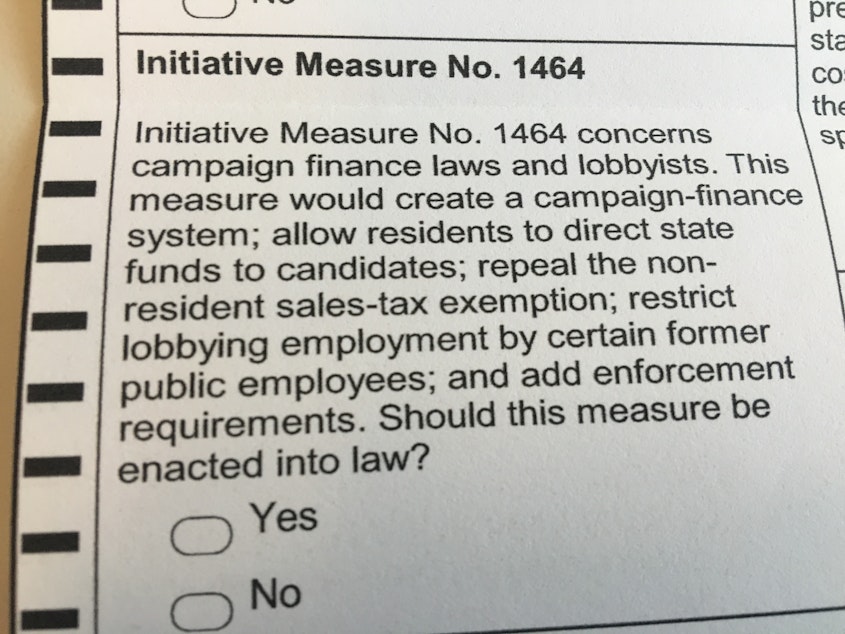The anti-corruption measure that big money couldn’t pass

Two campaigns on the Washington ballot this year stood out for failing despite spending lots of money. Hillary Clinton’s campaign raised twice as much money nationally as Donald Trump’s and lost (though she did win the state). The other big-money defeat didn't make big headlines.
Money usually wins
In politics, money usually wins — and donors to initiative campaigns face no restrictions on how much they can spend to try to sell ballot measures to voters.
Big bucks from billionaires helped persuade Washington to adopt a new gun control law.
Big bucks from labor unions helped boost the state's minimum wage and restrict freedom of public information.
Sponsored
Big bucks from the construction industry helped sell the Seattle area on higher taxes for a bigger light rail system.
But one of this year's richest initiative campaigns couldn't close its sale with state voters.
Source: Washington State Public Disclosure Commission, as of Nov. 18, 2016. Graphic: KUOW/Abraham Epton Initiative 1464 would have made sweeping changes to the role of money in politics, including limiting contributions from lobbyists and government contractors. It would have given each Washington resident $150 to distribute to candidates of their choice.The full text of the initiative is 12 pages long.One of its campaign ads begins, "Four things you should know about Initiative 1464.""That's three too many," Seattle pollster Stuart Elway said of the ad.Voters almost everywhere turned I-1464 down: Only King County and the San Juan Islands said yes.I-1464 had little opposition — and $4 million, mostly from out-of-state donors, including Jonathan Soros of New York and J.J. Abrams (yes, that J. J. Abrams) of Hollywood, behind it. Their aim, paradoxically, was to reduce the role of big money in Washington politics.The Wild West of corruptionA lot of the same players, including Soros, Abrams and the Massachusetts activist group Represent.Us, supported a similar measure on the ballot this year in the Wild West of secrecy and corruption: South Dakota."Fewer things are illegal here," South Dakota State University political scientist David Wiltse said. "South Dakota has very, very loose restrictions on lobbyists and has at least a reputation or appearance of some strong corruption."The Center for Public Integrity ranked South Dakota 47th in the nation for government accountability and transparency last year. (Washington ranked eighth.)South Dakota voters passed the measure known as the "Government Accountability and Anti-Corruption Act" this month despite opposition from the red state's top elected officials and $600,000 spent to stop it by an anti-transparency group closely associated with the conservative billionaire Koch brothers."We believe in the right to privacy in the causes that individuals choose to support," Levi Russell with the Koch-backed Americans for Prosperity said. He said the group didn't fight the similar measure in Washington state because Americans for Prosperity doesn't have a local chapter there.In South Dakota, at least, the timing was right for the initiative, according to Wiltse. "An angry electorate just gobbled it up," he said."It was something that hit the right year with a very cynical electorate, and they wound up passing it," Wiltse said. "This probably wouldn't have passed in another year."'It is kind of curious'Back in Washington state, voters did pass one ballot measure that aimed at tackling corruption."People understand that the money in politics is out of control," said Cindy Black, chair of the Yes on 735 campaign.Washington voters said yes to I-735, even though it doesn’t have any real impact.It only urges our members of Congress to help overturn the Citizens United decision. That case opened the floodgates of political money six years ago. Overturning it would take a Constitutional amendment, not just an act of Congress."Ours was really sending a strong message we don't like how this money in elections is affecting us, and we don't like how these Supreme Court decisions [have] affected elections," Black said.The I-735 campaigners raised five times less money than their like-minded colleagues on the failed I-1464 campaign."It is kind of curious," said Elway, who has been conducting polls for 40 years.In October, his poll showed 41 percent of voters undecided about I-1464 – more than any other initiative.Elway said I-1464 probably had the most convoluted wording of any ballot measure he's seen in years."The old saw is that confused voters vote no," he said. "Yes, that's true, but unconvinced voters vote no, and if they're confused, they're not going to be convinced."Elway said it was hard for almost any campaign to get voters' attention this year, except one. "I think the presidential race took a lot of the oxygen out of the room in this state," Elway said.But those factors would also apply in South Dakota, where voters approved a version of the complicated clean-politics initiative that failed here.Anger at the political establishment could be the difference."We just didn't have the sense of anger it was reported on around the country," Elway said. "We're a pretty blue state."Voters in largely liberal Washington appeared less upset about the status quo than voters in largely conservative South Dakota."Maybe what we needed was a good scandal to push this over the top," University of Washington political scientist Mark Smith said.If activists try again to get these kinds of reforms on the Washington ballot, voters will have more of a track record to judge them by.The city of Seattle launches its voter-approved system of publicly funded campaigns in January.

